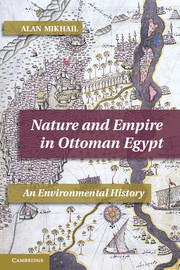Book contents
- Frontmatter
- Contents
- Maps
- Figures
- Tables
- Note on Transliteration and Dates
- Abbreviations
- Acknowledgments
- Map 1 Egypt and the Ottoman Empire
- Map 2 Lower Egypt (Nile Delta)
- Map 3 Middle Egypt
- Map 4 Upper Egypt
- Map 5 Cairo and Surroundings, 1801
- Introduction: Empire by Nature
- 1 Watering the Earth
- 2 The Food Chain
- 3 The Framework of Empire
- 4 In Working Order
- 5 From Nature to Disease
- 6 Another Nile
- Conclusion: The Imagination and Reality of Public Works
- Appendix: Citations for Cases Included in Tables 2.1–2.4
- Bibliography
- Index
- Titles in the series
5 - From Nature to Disease
Published online by Cambridge University Press: 03 May 2011
- Frontmatter
- Contents
- Maps
- Figures
- Tables
- Note on Transliteration and Dates
- Abbreviations
- Acknowledgments
- Map 1 Egypt and the Ottoman Empire
- Map 2 Lower Egypt (Nile Delta)
- Map 3 Middle Egypt
- Map 4 Upper Egypt
- Map 5 Cairo and Surroundings, 1801
- Introduction: Empire by Nature
- 1 Watering the Earth
- 2 The Food Chain
- 3 The Framework of Empire
- 4 In Working Order
- 5 From Nature to Disease
- 6 Another Nile
- Conclusion: The Imagination and Reality of Public Works
- Appendix: Citations for Cases Included in Tables 2.1–2.4
- Bibliography
- Index
- Titles in the series
Summary
If labor contributed to the transformation of Egyptian peasants into a working population and helped define the contours, size, and shape of the population, then plague delineated the spaces and borders of that social body, with the disease becoming a target of new social, epidemiological, and environmental forms of knowledge at the end of the eighteenth century. At the outset, we must first understand that plague was considered “natural” in Ottoman Egypt. Throughout the Ottoman period (and long before), plague functioned as a regular part of society and the environment, like the annual flood, drought, or rain; it was something Egyptians expected and to which they had adapted their lives. Plague was indeed a necessary and vital part of Egyptian culture, as it enabled the exercise and creation of sets of social practices and institutions. Thus, as I show in the first three sections of this chapter, plague existed and was thought of by eighteenth-century Egyptians as a regular part of their natural world – indeed, as an environmental force like any other.
By the end of the eighteenth century, however, and into the nineteenth, plague came to be set apart from society. Mainly through the implementation of the European technology of quarantine, Egyptian society was in this period cut into two: spaces of the living in which society and culture existed and quarantined spaces in which the infected went to die.
- Type
- Chapter
- Information
- Nature and Empire in Ottoman EgyptAn Environmental History, pp. 201 - 241Publisher: Cambridge University PressPrint publication year: 2011



